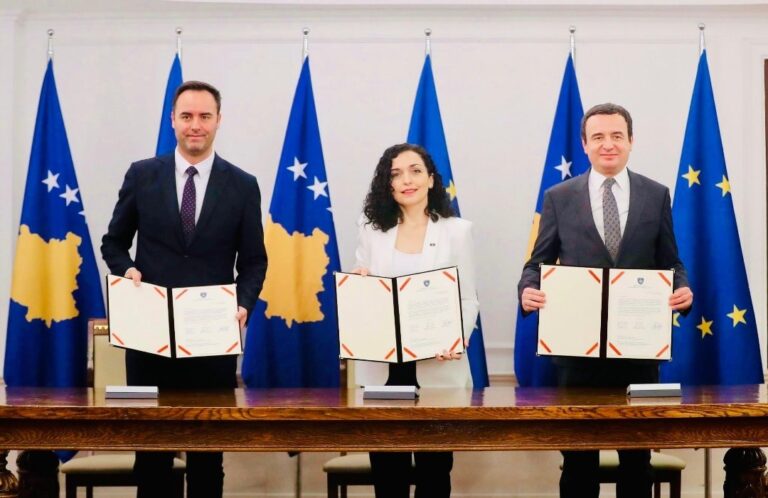The Russian invasion of Ukraine not only reshaped the global order but also altered the trajectory of international relations. The stability of Europe was shattered on February 24, 2022, when this act of aggression reignited fears of conflict expansion, particularly in regions with fragile sovereignty, such as the Balkans. Russia has attempted to interfere and destabilize Western Balkan nations by inciting conflict through its Serbian proxies, yet these efforts have largely been unsuccessful. Since the onset of the war in Ukraine, hybrid warfare, inflammatory rhetoric, and the spread of anti-Western narratives have intensified in this region. Kosovo, in particular, has been a frequent target of Russian disinformation, especially in response to its government’s efforts to assert sovereignty in northern Mitrovica.
The renewed conflict in Europe has necessitated a choice between aligning with the East or the West. Most European nations have unequivocally sided with Ukraine and Western democratic values, as has Kosovo. However, Serbia remains an exception. Despite President Aleksandar Vučić’s occasional portrayal of pro-Western and democratic values, Serbia continues to implement policies that align with Moscow’s interests, fostering instability in the Balkans.
On January 20, Donald Trump assumed the presidency of the United States, with promises that included ending wars within the first weeks of his term. As the international order undergoes transformation, American foreign policy in Europe is being redefined. This uncertain landscape presents unpredictable challenges for Kosovo, particularly as the U.S. recalibrates its approach to resolving global conflicts.
Meanwhile, Kosovo faces internal challenges, including delays in forming a new government due to technical difficulties within the Central Electoral Commission. The political landscape demands compromise that parties appear unwilling to make, potentially preventing Kosovo from keeping pace with recent geopolitical developments. The year 2025 must be one of quick decisive action. With Kosovo’s foreign policy at one of its weakest points, the country must reassess its approach. Mistakes made in dealing with the Biden administration cannot be undone now that Donald Trump has returned to office.
As Trump engages in negotiations with Putin over the war in Ukraine, Kosovo must prepare for consequential decisions, some of which may not be in its favor. One early indicator of a shift in U.S. policy is Trump’s letter to Vučić on Serbia’s Statehood Day, in which he expresses a desire to strengthen the U.S.-Serbia partnership. Notably absent from this correspondence is any mention of Kosovo, a stark departure from previous U.S. positions. Additionally, Serbia’s continued encroachments on Kosovo’s territorial integrity appear to have been overlooked. This shift in diplomatic tone could foreshadow significant repercussions for Kosovo in the near future.
Given this evolving geopolitical context, Kosovo must change course from the approach taken by the previous government. Actions such as altering license plate regulations, halting the circulation of the Serbian dinar, and closing Serbian-run parallel institutions resulted in EU sanctions and a cooling of relations with the U.S. These moves were deemed abrupt by the international community. Calls from the U.S. and EU for de-escalation were largely ignored by the Kosovo government. Despite these warnings, the government even planned to open the ‘Ibri Bridge’ on the eve of an election campaign. At the time, U.S. Ambassador Jeffrey Hovenier cautioned that such an action could endanger American soldiers. NATO’s peacekeeping mission in Kosovo (KFOR), which maintains a presence at the bridge, also signaled its readiness to intervene if security was threatened. Prime Minister Albin Kurti’s confrontational stance toward the U.S. has had damaging consequences, particularly given that Kosovo’s freedom and democracy are built on a strong partnership with Washington.
Kosovo’s new government must completely redefine its approach to U.S. relations, as the country finds itself in its most precarious position since declaring independence. The missteps of recent years could lead to a reassessment of the American KFOR presence or the imposition of a “take it or leave it” agreement with Serbia, dictated by Washington. Recent U.S. actions demonstrate a disregard for international norms, and Trump has shown little inclination to involve Europe in key negotiations. His approach to resolving the Ukraine conflict, his stance on displacing Palestinians from Gaza to build the “Riviera of the Middle East,” and other policies suggest that Serbia may emerge as a stronger player if Trump-Putin negotiations proceed in a certain direction.In this shifting landscape, Kosovo must navigate American policies carefully, recognizing that it no longer commands the same level of attention from Washington. As the 17th anniversary of Kosovo’s independence approaches, the nature of the U.S. congratulatory message will be telling. Kosovo is already beginning to feel the consequences of Trump’s decisions, including the closure of USAID operations in the country. USAID has invested over a billion dollars in Kosovo’s development, particularly in governance, law enforcement, security, and accountability. The withdrawal of such support signals a broader shift in U.S. priorities. Moreover, Kosovo and Serbia signed an agreement in Washington in 2020 during Trump’s first term. Among its provisions, only Israel’s recognition of Kosovo has been implemented. There has been little political will to bring the two sides closer together. This stagnation, coupled with changing geopolitical winds, suggests that Kosovo must adopt a more pragmatic and strategic approach to safeguard its interests and avoid further diplomatic isolation.




